Ruth Ann Nordin's Blog, page 22
June 18, 2021
Branding (A Post For Writers)
Your brand is how you can stand out.
Today’s post is inspired by one of my favorite creators, Creative Hive. She makes handmade craft items, but a lot of her input applies to writers, too.
Now I’m going to share what I got from this video using the “writer” lens.
Branding Your BooksThis applies specifically for authors who’d like to make money on their books. I did address this in an older post, but I think it’s worth mentioning again because the key to branding is letting your readers know what kind of books you write. People who love your work love it for a reason. The more specific you can get, the better. All genres can be broken down into smaller segments. Do you have a unique angle within your genre that sets you apart from other writers? If so, that will narrow your brand down even further.
I have a unique angle within the historical romance genre. I write Christian romances where the characters wait until marriage to have sex, and when they do have sex, I show it. I do not get preachy because I hate preachy Christian fiction. I don’t always come out and state that my main characters are Christians, but they are. If they aren’t Christian at the beginning of the book, they will be at the end. I will insert overtly Christian messages into a book when it fits the plot. I prefer to keep things as natural to real life as possible.
Most historical romances authors don’t use this particular angle. The only two authors I know who do historical romances the same way I do are Carolyn Davidson and Rose Gordon, and I’m not sure if either one of them are still writing books. So my angle is very specific. It appeals to a smaller audience than your typical historical romance reader, and this does mean making less money overall. Keep that in mind when thinking of your brand. If you want the potential to make a lot of money, you might want to broaden your brand. Still, whatever brand you choose, stay true to it so readers know what to expect when they buy your book.
Also, when you’re branding your books, I advise picking only one or two genres to write. The reason for this is that people who love romance don’t tend to read thrillers or fantasy. (I know this from experience.) But people who love Regency romance might be willing to read historical western romance and vice versa. Those two genres are sub-categories of romance. There’s some overlap. Likewise, science fiction and fantasy are genres that can appeal to similar readers. Thrillers and horror seem to be a natural match, too. I’m sure there are others.
My point is that writing a variety of genres can dilute your brand, especially if they are wildly different from each other. It’s hard to build up a substantial readership that will follow you over time if you don’t have a solid brand. This is the reason I don’t write fantasies or thrillers anymore.
Branding Yourself OnlineYears ago I read an article that said it takes people 8 times of seeing your book to remember it. Through the day, people are exposed to so many things that their subconscious mind has to filter all of the “noise” from their conscious awareness. If we picked up on every single thing around us, we’d go crazy, and in a world where we have the distractions of the internet, we need that filter more than ever.
That being said, I believe it’s important to stick with similar colors and images on all of your sites, such as blogs, websites, emails announcing new releases, and personal storefronts. These colors and images are a snapshot view of “you”. I don’t necessarily think all of your books have to look similar, but there should be a similarity within the series.
I think it’s also important to be consistent with the type of content you create on a blog or social media. You don’t have to repeat yourself all the time, but work within something that represents you, both personally and professionally. You are a part of your branding. The way you present yourself will inadvertently market your books because what people see coming from you online will affect what they think of the books you write.
I think you should be authentic. There’s no sense in trying to be someone else. There is only one you, and you have something to contribute that no one else can. There’s no point in trying to be someone else. I’ll explain why by sharing my own personal experience.
Back in 2012, I admired an author who had the gift of telling stories from real life that were so funny that she attracted a lot of comments. Those posts were fun to read. I enjoyed them as much as the others did. I tried writing a couple of posts about my personal life in a way that would make others laugh, too. Unfortunately, I didn’t have her gift. I’m going to age myself here, but does anyone remember the Bob Newhart shows–both the original in the 70s and the new one in the 80s? Bob Newhart’s characters were “dry” and “boring. On the show, this was funny because the the people around him were a strong contrast to his character. While this was funny on TV, it’s not funny in a blog post. The incident with my kids might be funny in real life, but the way I wrote the incident read like a technical manual. It was boring. I had to come to the conclusion that I’m not the author who had a gift for making her personal life so much fun to read about.
After experimenting with different posts, I finally realized my “niche” is writing posts as if I am sitting across from you and sharing a cup of coffee while I talk. It’s informal and relaxed. It’s like talking with a friend. Some authors are much more professional in their tone than I am. That’s their “niche”. They’re not me, and I’m not them. So there’s no point in them trying to be me, nor is there a point for me to try to be them. We’re all better off just being who we are. Whatever your personality is, make that personality work for you. Let other people see who you are.
Branding is About Quality More Than QuantityI still believe that taking the time to write the very best book possible is worth it. I don’t think rushing books is a good idea. Even though money is something we want, we should devote everything we have into what we’re writing. I believe that, in the long run, producing quality in the eyes of our readers is what matters most.
Notice I wrote “in the eyes of OUR readers.” It doesn’t matter what the critic thinks. It doesn’t matter what our family or friends think. What matters is that we’re satisfying our readers. Quality is subjective. I know it’s easy to forget that when someone comes to you with a scathing review. It’s also easy to forget when you know a family member or friend really didn’t like your book, but to spare your feelings, they tell you they enjoyed it. Scathing feedback and false sincerity are both hurtful. That’s why I keep saying to focus on the people who love your work. They are your barometer of quality.
I have yet to come across a reader who has said they are willing to give up quality in order to have me publish more books in a year. While they might want more books (and it’s a compliment when they say that), they would rather have me take my time and produce something of quality. They are willing to wait. So don’t worry about trying to get X number of books out in a year. I know this is a huge deal in the writing community because everything is about maximizing income. I like making money as much as everyone else, but if you’re writing sloppy stories, how long do you think it’ll be before you hurt your brand? Eventually, readers will say, “This author used to write great books, but lately, something is missing. I’m done buying their books.” That’s the kiss of death.
A quick note on readers burning out:
Personally, I think we’re in such a “hurry up and get it out there” author culture that it’s easy for readers to burn out on the same author if that author has a new book coming out all the time. Having a waiting time between releases helps to give readers a break so they can read other authors’ books. The break is good. I think when you’re not getting a new book out all the time, readers will enjoy your books that much more because they weren’t trying to keep up with all of your books.
I mean, I enjoy certain types of movies, but I can’t watch them all the time. I need to break up the monotony and watch something else for a while. The same thing is true with music artists. There’s one that puts out a new song almost every week. It’s just a 3-4 minute song, but it wore me out when I was trying to keep up with all of his new releases. I ended up walking away for a couple of months just to catch my breath.
/burnout
A final thought: contrary to public opinion, you don’t need to write every single day. What other job would you say someone isn’t a real _____________ if they didn’t do it every day? We wouldn’t say it to a teacher or a doctor. My husband is a car detailer, and he takes days off. When he was in the military, he was on call and had exercises, but he still had days off. As writers, we should have days off. These are days to relax the mind. They can be days to get caught up on updating our website or catching up on emails. Or we can binge watch movies all day. Or maybe we can take that hike we’ve been meaning to get to. It doesn’t matter what we do just as long as we’re giving our creative wells time to fill back up. When we allow ourselves time to decompress, we are in a better position to create quality stories. Believe me, there’s nothing worse than putting a book out there and realizing it doesn’t represent your best work. I’ve made that mistake early on, and I have since rewritten those stories. I would have been better off taking my time instead of rushing them. Quality matters.
June 14, 2021
Updates on What I’m Writing
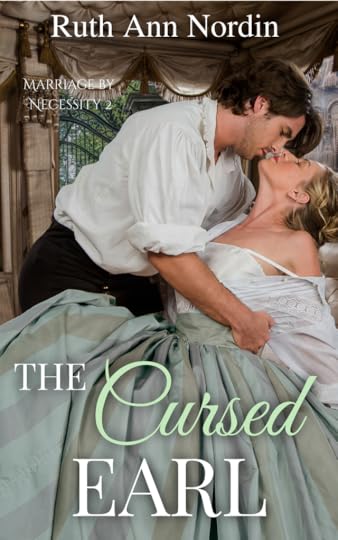
Books in the Marriage by Necessity Series:
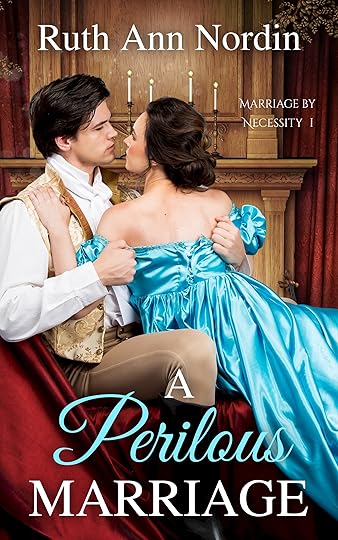

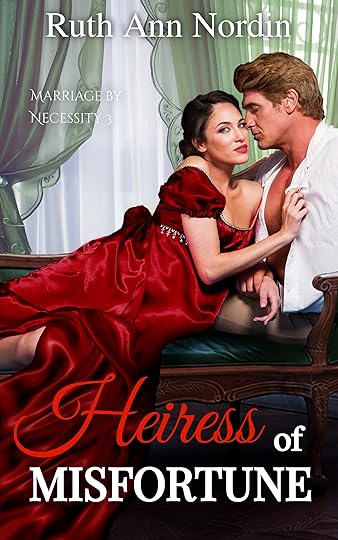 Might be a Book 4
Might be a Book 4
I’m finally on Chapter 5. Considering I started this book back in March, it’s frustrating I’ve made so little progress, but it is why I pushed the release month from September to November.
Part of the delay was having to rewrite about half of An Earl In Time. I ended up putting all books on hold and focusing in on that book for a good month. An Earl In Time also turned out to be longer than what I usually write, so that didn’t help, but I was determined to fill in all of the loose ends. I didn’t see the point in making it a series or a serial. Despite all of the frustrations, I am glad I wrote An Earl In Time. It’s just that sometimes I wish there were two of me. 
Since I did have such a wide gap between starting The Cursed Earl and finally getting to chapter 5, I forgot how I was going to bring Christopher Robinson and Lord Edon into this book. All I jotted down in my notes was “Lord Quinton, Lord Edon, and Mr Robinson”. I’m sure those three were going to be connected. I have Lord Quinton. He’s a new character, and his role has a direct impact on the hero of this book. But I have no idea what I was going to do with the my favorite two Regency characters. If they don’t fit in here, I’m sure I’ll find another place for them in a future book.
The Loner’s Bride (Wyoming Series: Book 4)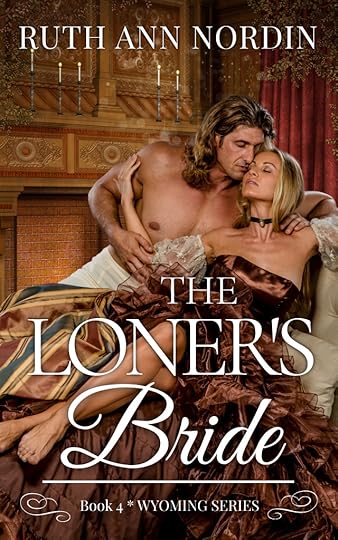
Books in the Wyoming Series:
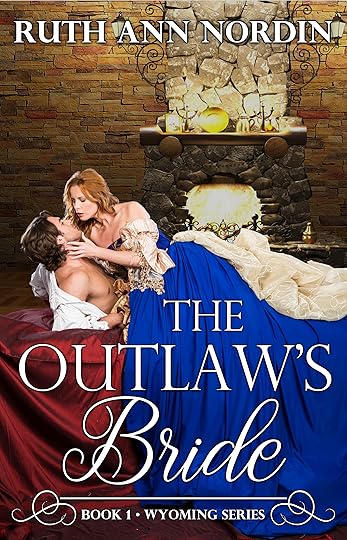
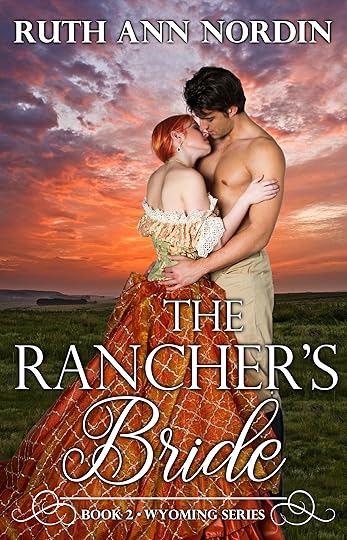
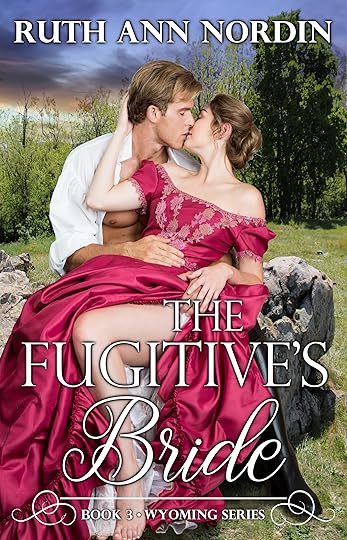
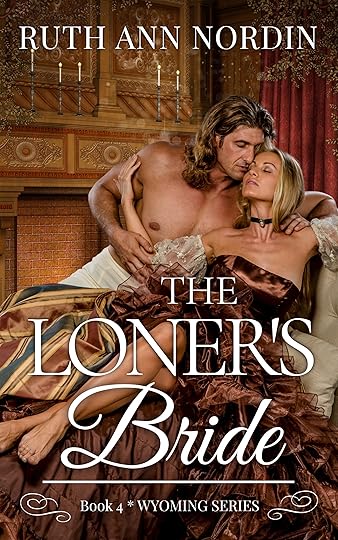
I’m on Chapter 2. It’s funny that I never really understood why Jeremiah wasn’t interested in a romantic relationship with Abby in this series. On paper, they probably seemed like a natural match since he was a good family friend and they’ve known each other for the longest time. I knew Abby only saw him as an older brother, even though I never came out and stated it. I never got that deep into Jeremiah’s thoughts in The Rancher’s Bride since he was preoccupied with finding Abby and Lloyd. But from Abby’s viewpoint, she had zero romantic interest in Jeremiah. In fact, the prospect of a romance between these two was so far removed from her that it never even made a blip on her radar, hence why I never even addressed the “why” she wasn’t interested in him.
It wasn’t until I started Chapter 2 (Jeremiah’s point of view) in The Loner’s Bride that I finally understood why he has no interest in Abby. Until I’m writing a character’s point of view, I don’t really understand why the character does and think the things he/she does. This is probably why plotting doesn’t work for me. I think they term a writer who learns as they write a “discovery writer”. I had to look it up online, and I’m right. A discovery writer is a writer who has very little (if any) idea on how a book will end up. They just start writing and see how things unfold. That’s how I write, and it’s why I can’t answer questions I’ll get once in a while from someone who wants to know why a certain character did or didn’t do something. I might have written something in the book, and I know it’s what the character wanted to do, but until I’m in that character’s head, I can’t tell anyone why the character did it.
So basically, I start a story and let the character tell me who that character is. That’s how I figure out a character’s personality. A character’s personality shapes the story. Based on the character’s personality, that character will make certain decisions that will end up impacting things (for better or worse) as the story progresses, and as a result of this, other characters will react based on their personality traits. Then those characters’ decisions will impact how the character acts in turn. So it’s like a cycle that builds on itself. This is why twists often pop up when I’m writing. I’m often blindsided by about half of the stuff my characters end up doing simply I can’t predict their actions until I’m writing the scene.
The reason Jeremiah never had an interest in Abby was he doesn’t see her as a woman. He sees her as a “boy”. Abby’s not really equal with her brothers since he does feel protective of her, but she’s not really a “girl”, either. I’m not sure if that makes sense or not, but that is his perception of her. She’s halfway between a little brother and an adult woman. This realization came to me when I was writing the scene where she asks him to help Katie find a husband. Katie will be staying at the orphanage to help the widows and him take care of the children. Katie is now 20 and ready to get married, but Abby wants her “older brother” who happens to live in the center of town to be her chaperone. Anyway, as Abby is buttering him up to help Katie find a husband, she’s batting her eyelashes at him, and all he’s thinking is how ridiculous she looks because (to him) she looks like she’s trying to blink away a bug that’s in her eyes. So there’s no way Jeremiah could ever be matched with Abby.
Katie, however, is going to be a different story. Katie is feminine in how she looks and in her personality, and those two things will attract him. I had no idea this was why my subconscious mind told me that Jeremiah’s only match was going to be Katie. I shied away from writing their story because of the age difference. She’s going to be 20, and he’ll be 44, but as someone pointed out, Katie’s mature for her age. The men who are her age won’t appeal to her. To them, they’re going to be like “boys”, not grown men. This is all in her personality. This is why a character’s personality impacts everything. I’m hoping that I’ll get to do a scene where Katie bats her eyelashes at him. I think his reaction is going to be completely different than what it was when Abby did it.
Suitable for Marriage (Husbands for the Larson Sisters Series: Book 3)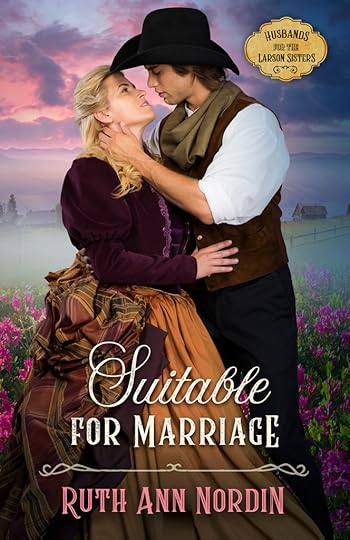
Books in the Husbands for the Larson Sisters Series:
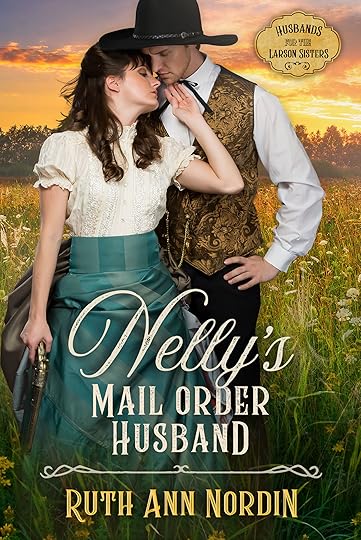
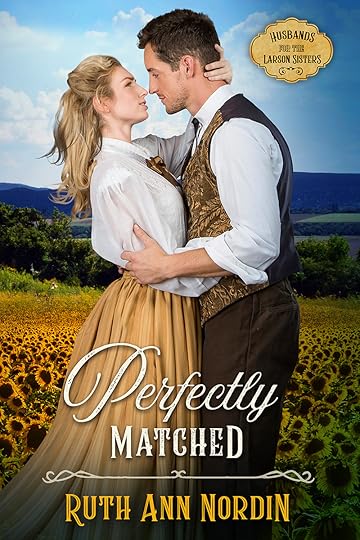
 There will be a Book 4
There will be a Book 4
I’m in Chapter 5 of this one. I started this book way back in December. It’s been very slow going on this one, but the ideas are finally flowing. I hope that keeps up. I have this set for March 2022 for a release month just in case it stalls out again.
Erin’s goal is to get Alex to give up his pursuit of her. His past proposal when he gave her a frog with a ribbon tied around it and a love letter didn’t impress her.  He’s been doing other things to woo her, but he doesn’t have the slightest idea of how to be romantic in a way that actually appeals to women. So he’s a great guy. He just doesn’t know what he’s doing.
He’s been doing other things to woo her, but he doesn’t have the slightest idea of how to be romantic in a way that actually appeals to women. So he’s a great guy. He just doesn’t know what he’s doing.
As a result, Erin’s desperately trying to find a young lady somewhere in Omaha who’ll take an interest in him. Alex knows exactly what she’s doing, and since it offers him a chance to spend time with her, he is going along with it. It wasn’t until I was writing in this story last week that I realized Daisy is starting to feel sympathetic toward him. That idea came to me when Daisy told Erin to be nicer to Alex. Alex’s initial thought was that Daisy might be an ally. So he’s going to ask Daisy for help, and I think Daisy will go along with it, even though her initial plan was to help Erin. We’ll see how Erin reacts if she catches on to what Daisy will be doing. It’s possible Erin won’t figure it out. I’ll find out as I keep writing.
June 10, 2021
You’ll Never Please Everyone, So It’s Pointless To Try (A Post for Writers)
The topic of this post is probably the #1 reason why it’s best to write what you want. If there is a single person out there who loves your story, it ought to be you since you’re the one who is writing it.
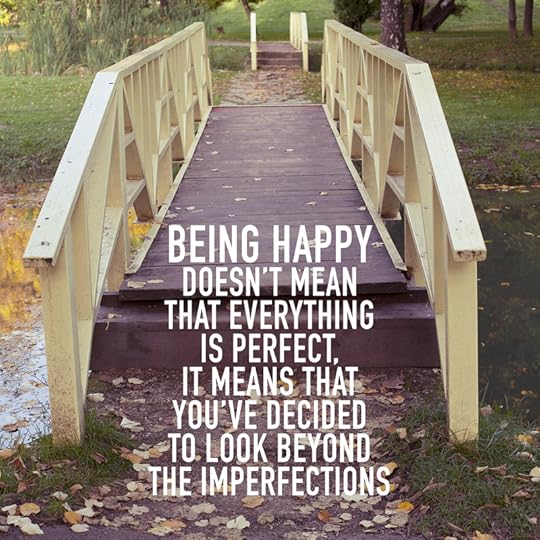 ID 80023395
ID 80023395Ayse Ezgi Icmeli | Dreamstime.com
No matter what you write or how you write it, there will always be someone who doesn’t like it. On the flip side, you’ll always have someone who does like it, which is good news.
Here are examples from my books to illustrate how people can have different opinions on the same book:
Book 1: Review #1 = “This author is awful with her historical knowledge.” Review #2 = “This author really gets into the time period with her understanding of how women were treated back then.”
Book 2: Review #1 = “Terrible grammar.” Review #2 = “Considering this was self-published, the grammar was polished up.”
Book 3: Review #1 = “No, not a heroine who is NOT a virgin!” Review #2 = “It’s refreshing to have a heroine who isn’t a virgin while the hero is.”
I’ve heard it all over the past decade. The stuff some people love, others hate. There is no pleasing everyone.
There are authors out there writing stuff they don’t like in order to please someone else. Either they are trying to please enough readers to get lots of sales or they are looking for tons of praise through reviews and awards. They are putting their own interests aside in order to tailor their work to someone else’s version of “the perfect story”.
I know. We’re apt to think, “Hey, she’s making a living. It’s a job. Plenty of people have jobs they hate.” While that is true, writing isn’t a job where you can just do A + B and get C. The creative process requires focus and effort. Books aren’t a widget on an assembly line.
So let’s say that we have an author who is pleasing others at the expense of pleasing herself. She’s writing books other people want to read (rather than a book she wants to write). Consider how short life is. We are all only given a set number of days from the moment we’re born. How would you like to spend that time? Do you want to do it crying in misery because so much of your time is dedicated to writing something you don’t care about, or would you rather be pursuing something that is your life’s purpose?
I do think it’s important to earn money with your work. I know that sometimes your passion isn’t what pays the bills. In the case where you need your writing to pay the bills, I recommend hiring a ghostwriter and writing the stuff you enjoy. Or, if you can’t find a ghostwriter, then at least give yourself something to write that is your passion. That way, you can at least get some enjoyment out of your work while writing stuff that pays the bills. It will probably mean less money (because the less books you get out there that sells well, the less you’ll make), but this might be offset by cutting back on expenses. If you’re so strapped for money that you can’t afford to stop producing books that you hate, then you might need to get another source of income. I realize that the advice I just gave sucks, but I’ve come across enough authors who hate what they write so much that they say it’s sucking the life out of them. That’s a terrible way to live.
In the case of authors who are striving for praise, I see two problems emerge here. One, there will never be enough praise to satisfy the writer. And two, if the book reaches enough readers, eventually someone is going to hate it. So even if you are getting praise, someone is going to creep into your world and disrupt that euphoric feeling. Not everyone is polite when they offer up criticism. Some people are downright rude. Check out the way people talk to each other on Facebook and Twitter. These two sites best demonstrate how strong the hate is in the world. Why would you expect reviews to be any different? Rude people is something all writers must deal with at some point. This is why I tell authors to read the 1 and 2-star reviews on books from popular authors in their genre. Even authors who are popular get their share of hate.
Also, keep in mind that creativity is subjective. The person reading your book is going to come at it from their worldview. They will have likes and dislikes that could differ from yours. They might have certain expectations going into a story. If you don’t meet those expectations, they aren’t going to enjoy it. There’s just no way of vetting the people who find your book and read it. Likewise, there’s no way that people can vet every single book they pick up before they read it. The reader has to take a chance to find out if you’re the kind of author that writes a story they will enjoy.
So if your aim is to get the praise of every single person who reads your book, you might want to rethink this goal because it’s just not possible. Instead of aiming to write a story to please everyone, why not write it to please yourself and the core audience you’re writing for? It’s okay to care about what people think of your book. Just keep in mind who you are writing for. As long as you’re pleasing them, that’s all that matters.
June 7, 2021
Updates on What I’m Doing
So there will be no problem getting them out on their anticipated release dates. An Earl In Time will be out July 17. Interview for a Wife will be out September 25.
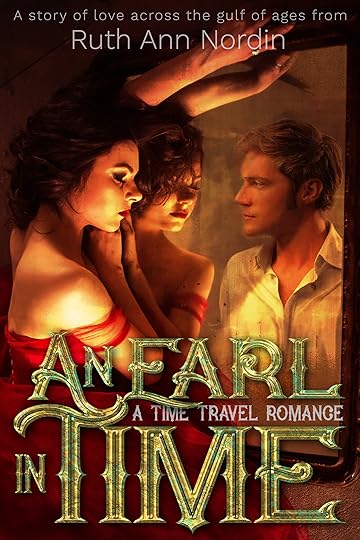
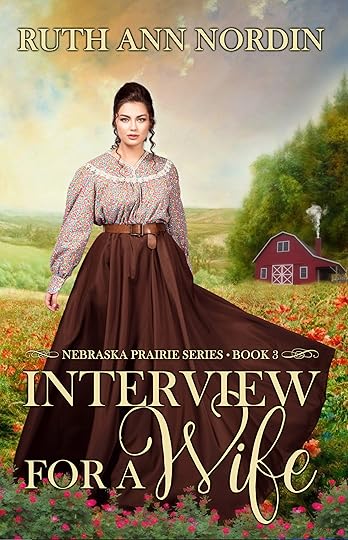
Ever since 2008, I’ve been using http://www.ruthannnordin.com. Up until recently, I’ve been able to make updates and whatnot. Well, the service provider I was using has pretty much made it difficult. I gave up and am letting that site run its course until it’s set to expire, which won’t be until next year. To be fair, the provider did warn me that their changes were going to make things difficult.
I have no desire to pay someone to do my website. I want to do it myself so that I can make updates any time I want. I’ve come across authors who have, for one reason or another, been unable to get the person in charge of their website to return their email or adjust their website in a timely manner. Yeah, I know these websites are more professional looking than what I do, but I prefer the ability to do what I want when I want with it.
I have decided to use WordPress since it’s been the most user friendly site I’ve come across. This blog, my monthly newsletter, and now my main website will be under WordPress. Here is the site if you want to check it out.
I updated my Payhip store.
I added the option for people to get pdfs. You can still get the mobi and epub versions, but I thought adding the pdf option might be easier.
Payhip also gave me the ability set up the storefront so that it’s easier to find the category of books someone it looking for. I have broken the books down according to Regencies, Historical Westerns, and Contemporaries. At this time, I can’t sort books into the series they’re in, though. Maybe that will come up in the future.
I also want to offer special deals that are beneficial to those of you who regularly come here. If you share the book page (let’s say Eye of the Beholder) on the social media options Payhip allows (Facebook, Twitter, and Pinterest at the moment), you can get 50% off of Eye of the Beholder.
When the next book comes out, I will try to come up with a nice deal.
I’m open to ideas on other special deals I can offer, so let me know if you have any.
I put up a couple of ebooks on Etsy.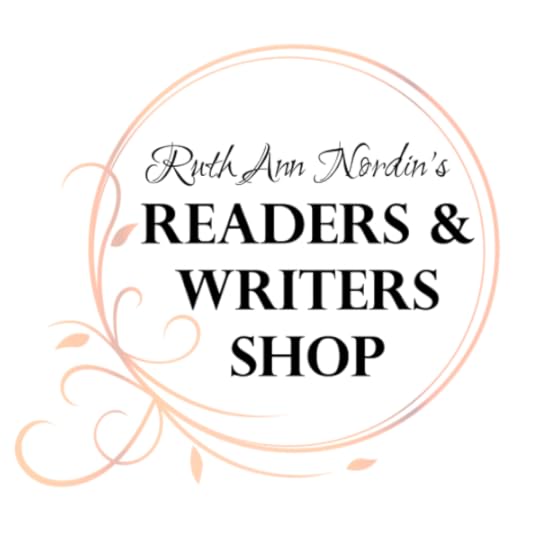
I’m hesitant with this one since I don’t know how many people want to buy ebooks on Etsy. It’s primarily known for craft items, but I saw a few authors offering signed paperbacks and ebooks. I’ve already set up the paperbacks I have on hand, but I just recently tried the ebook thing.
I think what I’ll do is offer a special deal on Etsy with the next ebook. All of these changes with Etsy and Payhip were made after A Perilous Marriage went live. I can’t offer any free books on Etsy because I need to pay $0.20 just to list it. So the lowest I can offer there is $0.99. I can offer the ebook in mobi, epub, and pdf format, though. At the moment, I haven’t put many ebooks up.
I’m interested in knowing if buying ebooks on Etsy appeals to anyone, so let me know what you think.
At some point, I do want to offer something for authors. I got halfway into a project and ended up swamped with other work. Except for blog posts, my thing for writers tends to get slogged down on my fiction stuff.
Speaking of which….
I’m FINALLY writing again!I know. It’s been so long. I had to dust out the cobwebs in my brain this morning.
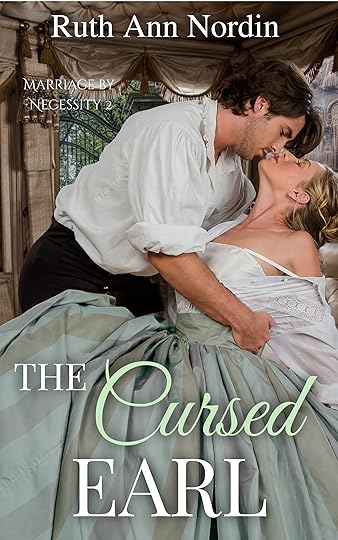


I had to go back through the Wyoming Series and calculate how old everyone is by the time we get to Jeremiah and Katie’s romance. I had to go over The Cursed Earl and Suitable for Marriage to remind myself of what was going on. I have been heavily in edits and tweaking book covers, Payhip, the website, and wrapping up the homeschool year with my youngest. There’s been some personal stuff going on in the family on top of it. So it just all added up.
I’m glad I got the bulk of everything done. Now my aim is to get back into the writing routine again. Then I won’t have to readjust my publishing schedule again. *fingers crossed*
June 1, 2021
How To Stop “Shiny Object Syndrome” In Its Tracks (A Post for Writers)
Today’s post is inspired by this video from Creative Hive:
It’s not just people who make handmade crafts who get tempted to stray. Writers can fall victim to “shiny object syndrome”, too.
In today’s post, I’m going to discuss the shiny objects and how to overcome them.
Shiny Object #1: A Fresh New Story IdeaUsually, when you get halfway into the story you’re writing, you get another story idea that excites you. It’s so fresh and exciting that it makes the story you’re working on seem drab and boring. The temptation is to set the current work aside to start the next one.
A new story idea often comes out of nowhere, and it comes at the most inconvenient time. The “to write” list is already high enough. All this does is add to it. If this sounds like you, you’re not alone. I go through this with almost every book I write. I am tempted to put the current story aside and get to work on the new one. As hard as it is, the new idea needs to be put on hold. If you don’t finish the current book you’re writing, there’s no way you’re ever going to publish it.
What makes this shiny object so bad is that the progress you’re making in the current work tends to slow to a crawl. Maybe it doesn’t do that for everyone, but it does for me. The current work becomes a chore. My advice is to stick with the current work in progress. Even if you’re going slow, you’re still getting somewhere. Set down a goal each day you work on the story. Great goals are specific. So set down either a certain word count or a certain amount of time you’ll work on the story. Once you reach the goal, you can quit. If you want to keep going, by all means, keep going. But I find having some kind of goal, even if it’s 500 words or 30 minutes can go a long way in getting through the muck of the “this story has lost its luster” phase.
One thing I will add to this is a warning. If you have no idea what comes next, either work on a future scene or put the story aside. If you’re truly out of ideas, it’s usually because your story went off course somewhere. After setting it aside for a while, you will hopefully be able to come back to the story later with a fresh new look at it.
However, if you find that you are consistently putting books on hold, then your problem goes deeper than simply running out of ideas. Some things you might want to try is writing a short story or a novella to see if you can finish it. If you can, gradually work your way to longer projects. While I’m a panster by nature, I think plotting might help anyone struggling with the problem of finishing what they start.
Shiny Object #2: Another GenreThis one applies specifically for writers who are trying to make money. If you don’t need to make money, you have the freedom to work on whatever you want. It doesn’t matter if you hop from one genre to another.
If, however, money is part of your goal (and I admit it is part of mine even though I write for passion), then you want to make sure you’re diligent about sticking with your brand. I’m not saying you can’t deviate from the genre you typically do, but if you do something different, it has to be a “once in a while” kind of thing. Part of branding yourself is being consistent with what you write. The reason branding is so important is because your readers need to know what to expect. When you stay with your brand, you’re someone they can rely on to deliver the kind of stories they will enjoy.
I know what it’s like to be lured to write another genre, but there are two problems that came up when I pursued the “other genre” shiny object. One, the books outside of my brand didn’t sell well, and two, I simply didn’t have the time to juggle more than one brand for the long haul. That’s why I suggest only writing the “other genre” book once in a while. It’s hard to make up for the loss of momentum on not getting a new book out in your brand, especially when books only stay fresh and new for a short time. Yes, you can run ads, but it’s really hard to match the power of a new release.
So my advice, for what it’s worth, is to only write in multiple genres if you have the time to devote to each genre you’re working on OR if you don’t need the money from book sales.
If either of those two things aren’t in your situation, then (as hard as it is), put those ideas in a file for the day when it is possible for you to devote the time to that genre. I don’t think you have to permanently give up on the genre; it’s just not the right time to work on it. Another idea is to let our mind play out the story during your free time. I’ve done this method, and I find that if I can get through the entire story in my mind, I no longer feel the urge to write it. (This is why I never plot anything out that I’m writing. Once I know how everything goes, I lose interest in the story.) If you’re the type of writer who wants to write something even more after plotting it all out, then I suggest just writing the idea down and tucking it aside instead of working the whole story out in your mind.
Shiny Object #3: A New Marketing StrategyThere seems to be a brand new marketing strategy coming out all the time. If you run after all of these, it’s going to be hard to establish a marketing plan that works for you. You don’t have to pursue every fresh new thing that comes along. In fact, it’s best if you don’t. You need time to write. All the marketing in the world isn’t going to help if you don’t have books to publish.
I’m not saying you should just write and publish without doing any marketing. You will need to do some form of marketing to get noticed. The key is to pick the areas of marketing you enjoy the most. I suggest sticking with 2 or 3 of these. If you want to sample something new to see if it’s a good fit for you, that’s fine. You don’t know unless you try, right? But don’t go around sampling every new thing that comes along. Pick our your strengths and run with them.
Some authors are great on social media platforms like Facebook, MeWe, Twitter, Instagram, etc. They make fun and interesting posts, and they have a high level of engagement with their readers. Some authors do great with ads. They enjoy spending time factoring in the click rates and the return on their investment. Some authors do great with blogging. They love updating readers and sharing information in a blog format. Some authors do great with their email lists. They love emailing their readers on a regular basis with updates and running special sales. Some authors do great with making You Tube videos. They love getting in front of the camera and sharing what they know with others through a verbal format. Some authors do great with in-person events. They love meeting others face-to-face and socializing. I could go on, but I’ll stop there.
It all boils down to your personality. What interests you? What strengths do you have? Those are the things you should focus on. There’s no point in doing something you hate or something that doesn’t mix well with your personality. I’m all for trying something new and stepping outside one’s comfort zone, but marketing shouldn’t be a chore.
Find the 2-3 things you enjoy and focus your efforts on them. You’re far better off doing that because you’ll stick with it year after year. When you’re in the writing business, you need to take a look at what’s best for the long term. Just as writing and publishing consistently is important, marketing should also be consistent. Authors that come and go in their marketing efforts seldom do well with their book sales. At least, there’s not a single author I’ve come across who stopped their marketing who has continued to do well with their sales. Also, chasing after too many marketing strategies can hinder you from gaining traction anywhere.
The writing business is a marathon. Sometimes it’s exciting and things are zooming along, but most of the time, it’s doing a little more each day/week to add to your brand. The important thing is that you’re progressing in the right direction.
***
Those are the three main shiny objects I’ve noticed when it comes to being a writer. If anyone has anything they’d like to share, I’d love to hear it!
May 27, 2021
A Perilous Marriage (Marriage by Necessity Series: Book 1) is Now Available!
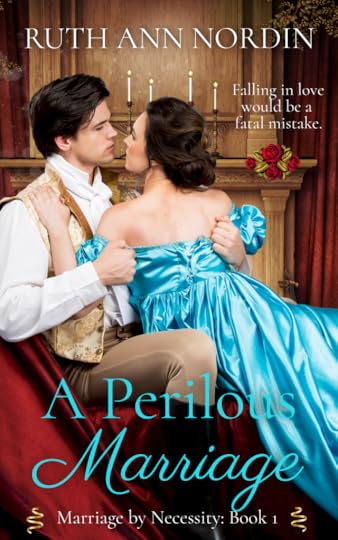
A quick note:
This book features Charles Duff, who is the brother of Heather. I first introduced Charles in Kidnapping the Viscount. Kidnapping the Viscount was Heather’s romance.
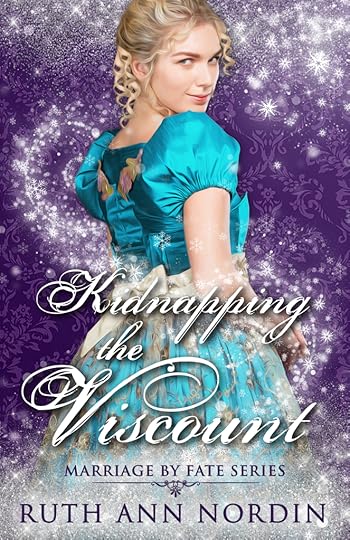
I introduced Miss Eris Tumilson in The Reclusive Earl. Her role is small, so there’s not much of her in it.
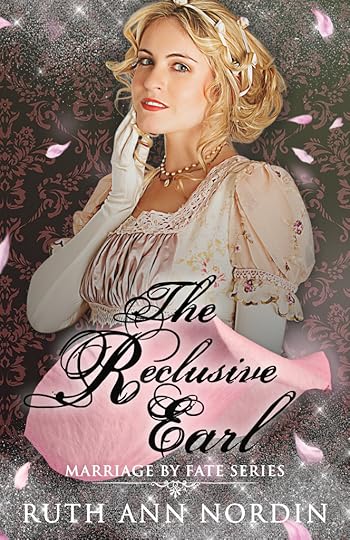
Some people enjoy it when I mention when a character appeared in another book, so I thought I’d mention these here. 
I currently have 3 books planned for this, but depending on how things go in Book 2, the series might expand to 4 books.
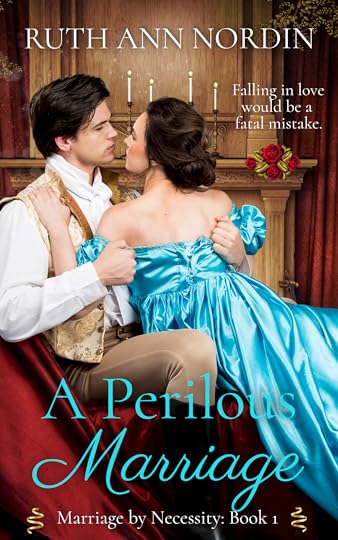


Eris, a wallflower and spinster, finally gets her chance to marry someone. On her wedding night, it turns out her new husband dies, but no one (including her) finds out about it until the next day. So poor Eris is left widowed and without even the possibility of having children all in one night.
Charles, known for jumping to conclusions in Kidnapping the Viscount, has once again jumped to conclusions. He is convinced that Eris murdered her husband. Her husband, by the way, happens to have been his best friend. Since he can’t convince the law that his friend was murdered, he sets out to prove it himself.
This is a story where the hero doesn’t trust the heroine right away, but he needs to play the role of the doting suitor. So he’s going to pretend to be in love with her. This is a romance, so there will be a happy ending.
If this setup sounds like the kind of book you’d like to read, here is where you can find it:
May 20, 2021
Updated My Publishing Schedule for the Next Year
I had to go in and move some books around for my publishing schedule. This is what I came up with. I was tempted to slip in a new series that I’m itching to start, but I’m going to be good and focus on the series I’ve already started. 
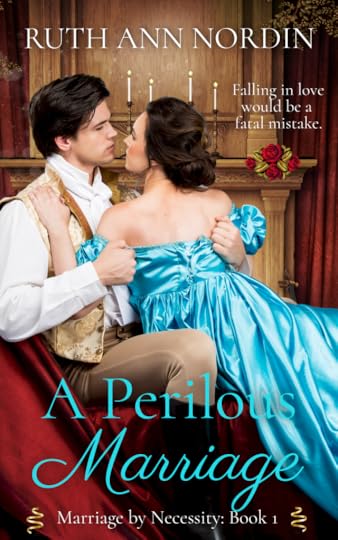
I can’t believe the 27th is almost here. In fact, I can’t believe it’s already May. Time really does go faster as you get older.
I currently have 3 books slotted for the Marriage by Necessity Series, but I just added a character in The Cursed Earl that might make this a 4-series book.


 Book 4 possible
Book 4 possible
(This is a standalone fairytale romance that does take place within my Regency world.)
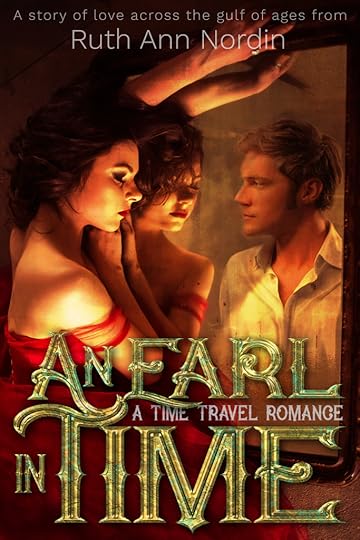
I am in the final stage of edits on this one.
Interview for a Wife will be out September 25
I am done with this one. I will start in on initial edits soon.
This wraps up the Nebraska Prairie Series. I’m excited to finally be able to cross this “wish” off my list since I had wanted to do this for years.
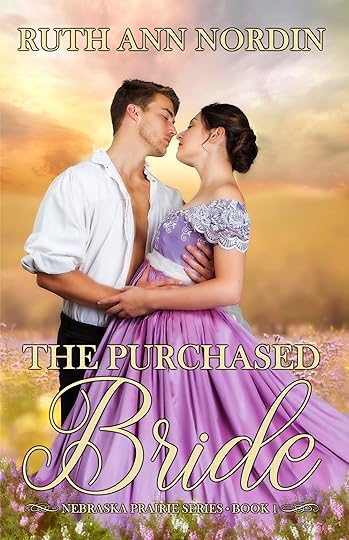



I’m only on Chapter 3 of this one. I have much more to go, so that’s why I pushed the release date back. I don’t want to rush a book just to get it out sooner. I want to make this book the best it can be.
The Loner’s Bride is due out January 23, 2022
I am about to start this one. I’m excited to finally write about Jeremiah and Katie, and since I’m itching to start it, I figured I’d move it up the publishing timeline. This will be the last book in the Wyoming Series.





I am in Chapter 4 of this one, but ideas are slow in coming. That’s why I pushed this one back down the publishing timeline.
This is Book 3 in the Husbands for the Larson Sisters Series. It does not wrap up the series. I plan to add one more book.


 Book 4 to come
Book 4 to come
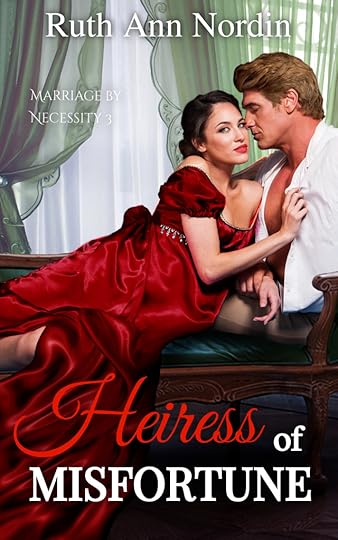
I won’t start this until I finish The Cursed Earl. That’s why this is pushed to a year out.
May 14, 2021
You Can’t Always Judge a Book by the Reviews
Seriously, you can’t.
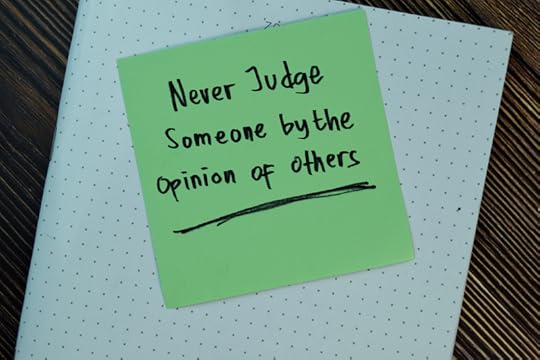 ID 205362659 © Bang Oland | Dreamstime.com
ID 205362659 © Bang Oland | Dreamstime.comThe value of any book’s average-review rating is psychological in nature. We’ve been conditioned to believe a book that has a 3-star or below average is a terrible book. It’s not true, but it’s the perceived value of the book. In getting my Psychology degree, I was exposed to studies that showed how real the “group think” phenomenon is. We all like to think that we’re independent thinkers who aren’t impacted by what other people say and do, but the truth is, we are greatly impacted by what others are saying and doing. A person has to be intentional in order to think independently. This is why reviews are so powerful in the world of books. In only one second, we form an opinion of a book simply by the average number of stars it has.
The trouble is, it’s easy to manipulate the book review system. I’ll give some real world examples below.
Reasons for fake 1 and 2-star reviews:
Back January of this year, a group of scammers on Goodreads sent out messages to some authors basically saying, “If you don’t buy our review service, we’ll go in and 1-star your books.” When the author didn’t pay, the scammers used fake accounts and did as promised. A few authors reported getting 30 1-star reviews in one day. Sure, if a reader were to dig in and take a look at the reviews, they would probably realize the author was a victim of a scam, but most readers don’t look beyond that snapshot “average star rating” that is placed right next to the book. Most readers would assume the book truly sucks and keep scrolling through books. The scammers know this, which is why they followed through with the threat. You can read about this in detail at this post. I never go to Goodreads, so I found out about this recently. Fortunately, enough authors went to Goodreads about it. (It takes a significant number of authors complaining to get things done.) From a casual search I did on Goodreads, it looks like Goodreads has resolved this issue. The authors were able to win over the scammers.
I only mention the thing about Goodreads to demonstrate how easy it is for anyone to create fake accounts with the intention of leaving 1 and 2-star reviews on someone’s books. Now, the scammers on Goodreads were looking to make a quick buck off of the fear of authors. In the author community, reviews are important. Retailers tend to offer preferential treatment to higher-starred books, and advertising companies won’t promote books unless those books have a certain amount of 5-star reviews. So whether we want to admit it or not, reviews matter.
People have other motives to try to hurt an author via the review than to make a quick buck. People who don’t like an author in real life have been known to leave nasty reviews on books out of spite. I remember hearing from an author years ago whose ex-wife made it a point to 1-star every book he put out with the intention of killing his author career. No amount of telling Amazon about those reviews got them removed.
Also, there are authors who’ve gotten 1 or 2-star reviews as soon as their books are released. It’s not the fact that those reviews popped up so quickly that is the red flag. The red flag is the fact that this happens to multiple books. One author said that she was seeing a trend where one person kept buying her books (for a verified purchase tag on Amazon), 1-starring the book, and within the same day returning the book. This happened to every single book in her series by the same reviewer within a week. I find it difficult to believe that the reviewer was sincere about giving any of her books a chance. The reviewer obviously had ulterior motives. And this happens quite a bit in the author community to other authors. I have dealt with this myself.
Also, sometimes books get a 1 or 2-star rating from other authors whose goal is to hurt their competitor. The author leaving the review doesn’t want the book to be successful (for whatever reason). I’d like to say every author in the community is supportive and encouraging, but this simply isn’t true. Authors do use reviews to hurt other authors. I’ll use myself as an example this time. Back around the 2009-2011 time period, there was a certain reviewer who made it a point to 1 and 2-star my books. It turns out she wrote in the same genre I did under a pen name. So when she was in the groups, she was known as X, but when her books said she was Y. This hid her real identify. The problem is that it’s a small world, and someone connected the dots and exposed her for being an author who was pretending to only be a reader. (A word of advice, if you are an author, you can participate in a reader community, but be honest about being an author AND resist the impulse to use the community to market your books. If you’re in a reader group, be there as a reader.)
I spent a lot of time talking about the low-star reviews, but there is the other side of the equation. Not all reviews are manipulated to hurt books.
Reasons for fake 4 and 5-star reviews:
Sometimes the system is rigged in favor of amassing favorable reviews. I remember talking to a writer in one of my writing groups who admitted to paying a review service to give her books glowing reviews because she was struggling to get visibility. She also happened to be paid for leaving glowing reviews on other authors’ books. Then there was another author who was later exposed for paying for reviews on his books. It was a big deal back in the early 2010s in the writing community. He got publicly shamed for this. I don’t know if it ended up hurting his career or not. All I know is that I learned this is a huge “no-no” in the author community.
Then there are authors and friends who 5-star each other’s books for the sole purpose of “boosting” the average star rating on a book. I should add a disclaimer here. I have no trouble with authors reviewing each other’s books as long as the authors give an honest review. If the author truly loves a book, they should be able to say so. The problem comes when authors are leaving glowing reviews just to boost the book’s reviews. Some authors don’t even read the book. They just throw out the 4 or 5-star review on the book. I have left reviews, but I only do it on books I’ve liked. I don’t want to be the author who trashes another author’s books. I do, however, aim to give my honest opinion. Over the years, I have become less and less inclined to leave a review. We’re currently in an atmosphere where authors leaving reviews can do more harm to an author’s book than will help. This is because readers tend not to trust those reviews. The best reviews are those by people who don’t write books.
Now, I will add, that authors should have free reign to review books dedicated specifically to authors. Writing craft books or marketing books are perfect for authors to review, regardless of how the authors feel about the book. If I’m going to invest my time and money into a writing or marketing book, I want to know if it’s worth it. I want the good, the bad, and the ugly in the review.
But for fiction, I think authors are better off raising other authors up, and my advice is that if you don’t like the book, don’t review it. This world would be a much better place if we all lived by the adage, “Treat others as you’d want to be treated.” I can’t think of a single author who would love it if another author left a low-star rating on their book. So why do that to someone else’s book? Let the readers take care of the fiction that’s out there. If the reader honestly doesn’t like the book, they can say it.
So let’s say you come across a book, but you’re wondering about the reviews. Can the reviews be trusted at all? I have a couple of tips to help in this regard.
1. Check the author’s history. What other books have they done? How long have they been around?
2. The best reviews are those where the reviewer gives you specific examples of what happens in the book AND their opinion. If the reviewer can tell you something that happened in the book and what they thought about it, then you’re almost certain that this is a legitimate review. Obviously, someone could get the cliff notes from someone about the story, but most people don’t take the time to go into detail about the books unless they’ve actually read the book.
3. Check the sample for yourself. The sample isn’t the entire book, but it should give you enough to decide if the book is something that you might enjoy. Ultimately, your satisfaction (or dissatisfaction) with a book is based on your own tastes, not someone else’s.
May 10, 2021
Things I Learned From Watching Disaster and Horror Flicks
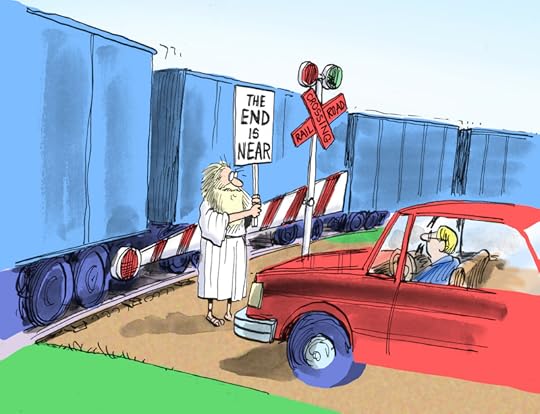
ID 33605278 © Andrewgenn | Dreamstime.com
Today’s post is just for fun.
1. Always dress comfortably. You can’t run well in high heels and a dress.
2. Always charge your phone before you go on a trip.
3. If you hear a strange noise, it’s probably wise to get the heck out of there instead of sticking around to find out what’s coming.
4. If someone leaves you a strange message warning you about something, it’s best to get out of town and never look back.
5. That person following you in the shadows probably isn’t your friend.
6. Don’t ever answer the phone from an unknown number.
7. Don’t sign up for an app telling you when you’re going to die.
8. If there’s some creepy legend about a place, don’t go there.
10. If you’re going on a trip, take a can of gas, a week’s supply of water for everyone in the group, nonperishable and easy-to-open food like military MREs, warm clothing, a Swiss Army Knife, and something to make a fire. A flare gun might also be a good idea so the helicopters can see you easier. Even if you think you have a reliable car, you can’t be too safe.
11. Never leave on a trip without resolving conflicts. The worst things seem to happen to people who fight before leaving. Plus, you don’t want to spend half of your time in peril sobbing because of unresolved relationship issues.
12. If you come to a small town and everyone is staring at you as if you have a second head, don’t stop to eat. Bolt for the next place.
13. Never trust the government. Chances are they’re coming up with some story to cover up their role in something terrible they unleashed upon an unsuspecting population.
14. Be the first one to get out of town. Otherwise, you’re screwed because as soon as everyone discovers the big disaster, they will ALL be trying to get out of town the exact same way.
15. If a horde of people start to come for your car, drive out of there like nobody’s business.
16. If you stop to take a video or get a look at the danger coming your way, you’re probably going to die. Just run and don’t look back.
17. In a storm, a stopped car is a doomed car. Just keep driving.
18. It’s often the best friend who’ll suddenly fall in love and want to sleep with your spouse. Don’t take both on the same trip.
19. Beware children of who are too mature for their age or just stare off into the distance.
20. If you’re babysitting, lock all of the doors and windows AND close all the drapes as soon as you enter the house. Also, never answer the phone or the door.
21. Anything can kill you. Get rid of anything sharp if you end up in a situation that is remotely “strange”.
22. If some weirdo starts spouting off about something evil coming, you might want to take his words into consideration. Many have died from just laughing off a lunatic’s dire warning.
23. Maybe it really is the end of the world. Might as well get to that bunker right now.
24. If aliens do arrive, they will NOT be friendly. Don’t go to the craft with welcome signs. Also, the military is no match for their technology, so the government won’t be saving you. Just get away from the major cities as soon as those UFOs arrive.
25. Genetic manipulation never leads to anything good.
26. Sadly, even a cute cat or dog can be dangerous. Trust your gut. If your pet suddenly seems strange, get rid of it (if possible).
27. Dolls can be creepy. Take one into your home at your risk.
28. Sometimes that goth teen who is a loner has the answers you’re looking for. I don’t know why, but teens seem to be smarter than adults who have had years and years of experience when “something wicked this way comes”.
29. If it came from space, don’t approach it.
30. If you’re rich, you’re probably doomed. People who’ve had to struggle for their whole lives in order to survive are the ones most likely to survive. Befriend the people with the bitter childhood that taught them life is cruel and unfair. Your chances of survival will go way up.
31. Be a prepper if you can. These are the people who always have what you need when the world is falling apart. If you can’t be one, befriend one.
32. Boil water before drinking it if it’s from a lake or other stagnant water. Many have been up all night with diarrhea from the organisms swimming around in that water. Might as well add a water purifier tablet or straw to your gear in Tip #10.
***
Those are my tips from years of careful study of watching movies that range across the spectrum of science fiction, thriller, and horror. If you have any tips you have, I’d love to hear them!
May 5, 2021
I Will Not Be Doing Kindle Vella (or Exclusivity In General)
 ID 44418116 © Vvvita | Dreamstime.com
ID 44418116 © Vvvita | Dreamstime.comI don’t know how many people have heard about Amazon’s new Kindle Vella. Written Word Media did an excellent post explaining it. I read the email Amazon sent out, and I checked out their video on it. In my opinion, Written Word Media does the best breakdown of this program, so I highly recommend the article if you’re wondering about it.
The downside to Kindle Vella
The reasons I won’t be putting anything into this is because I can’t put my story into a book format AND I don’t want to be exclusive. Yes, Kindle Vella is another exclusive program from Amazon.
I love putting my stories into books. I have nothing against serialized fiction, but I don’t like publishing stuff in that format. It’s why I dropped off of Wattpad. I gave it a try and didn’t care for it. It’s why I don’t do serials. I tried a serial early on with Return of the Aliens, and I felt the reader got a better deal by paying for the entire book rather than episodes. I know this is a highly controversial subject among authors. I have no trouble with authors who like this format of publishing. It’s just not my cup of tea.
Regarding exclusivity, I understand why authors are exclusive to Amazon, but this is something that has never appealed to me. For me, it all boils down to the freedom to do whatever I want with my books. I like being able to publish my books however, wherever, and whenever I want. That has always been the appeal to me even before self-publishing became acceptable. I like writing the story exactly the way I want it, I like being in charge of the cover, and I like being in charge of the pricing. The only thing I don’t like is writing the book descriptions because I’m weak at it. But as they say, nothing is perfect. 
A quick note about the ability to borrow my books:
Once in a while, I’ll have get a question from a reader as to why I don’t put my books into KU so they can take advantage of the “borrow” feature.
I’m on Scribd and I’m in libraries. Scribd offers a subscription plan where you can find my books. Granted, KU authors won’t be there, so that’s the downside to it if you’re heavily invested in KU. KU requires authors to be only on Amazon. They can’t be in other places. There is no such limitation in Scribd. Also, there are online libraries. Thanks to Smashwords, all of my books have the ability to be in libraries. You might have to ask your librarian about them getting my books to your library, which I realize can be a hassle, but the opportunity is there.
I avoid exclusivity for two reasons.
1. The freedom factor.
If I were to sign up for KU (or even Kindle Vella), I’d have to agree not to have my story anywhere else. That means I’m vulnerable to the retailer. Let’s say someone out there pirates my book and uploads it to a piracy site. Amazon would require me to deal with this or they will remove my book from their store. I’ve heard of KU authors going through this, and it’s a major headache because you have to nail down where your book is on a piracy site, you have to send a DCMA (which is a takedown notice), and then you have to hope the site actually removes the book. I have no control over someone out there who decides to take my book and put it on some piracy site, and I have no control over what the person running the piracy site will do. Piracy happens all the time to authors. Quite frankly, I don’t feel like chasing after piracy sites all day. I’m busy enough as it is with writing new stories, homeschooling a kid, and juggling the wife-and-mother dynamic (because I do want to spend time with my family). The last thing I want is Amazon breathing down my neck and threatening to remove my book because I went against their Terms of Service in KU.
2. The threat of removal from Amazon has already hit me, and I’ve never been exclusive to Amazon.
I had a couple of books removed from the Australian store. (There might be other countries Amazon has hit, but at the moment, I only know of one.) These books were under a publisher at the time. I asked my publisher about it, but the publisher had no idea this happened, and the books were never made available. I now have the rights to those books back and have republished them, but I don’t know if they’re up in the Australian storefront.
Also, there have been three instances now where I’ve gotten emails from Amazon threatening to remove one of my books from their store because of a price difference between retailers. This is how the email reads: “Your book is $0.02 cheaper on Kobo in this other country (then they name the country). If you don’t adjust the price in your Kindle Direct Publishing dashboard within five business days, your book will be removed since the Terms of Service say we must be the lowest price.” The problem is that even when I do the same price on all retailers, there will be a country that offers a different price. This is probably a currency conversation thing. I set my books at the US price and let retailers deal with the currency conversion. With 100 books out there, the last thing I feel like doing is going in and manually adjusting the currencies in every single country. There’s simply not enough time in the day to micromanage this.
Long story short, when I’ve gone into the dashboard over at Amazon, it turned out that I couldn’t lower the price in that particular country because I had it as long as it would already go. These were on my $0.99 books. The only price lower than that is Free, and Amazon won’t let you click a “Free” button. To get a book free on Amazon, you have to price it free on the other retailers and hope Amazon will price match it. In the end, I had to raise the price on the wide retailers to make Amazon happy. And that really sucked for readers on other retailers who should be able to buy their book at the same price an Amazon customer does. This is extremely frustrating. I can’t control how a retailer is going to convert currencies.
The bottom line is that Amazon can–and will–remove books at any time for any reason. At least when I have my books across multiple retailers, I have a buffer. If Amazon did remove a book for some reason, someone can go somewhere else to find it.
Exclusivity prohibits my ability to reach readers on other retailers, and some readers would rather not buy books on Amazon.
Now, someone might argue that If Amazon removed a book I did have exclusively there, I could always publish it on other retailers at that time. That would be a terrible decision. It would not only hurt me (from building up my audience on those other retailers), but it would hurt the person who wants to read the book on a retailer that isn’t Amazon. My original reason for not jumping into KDP Select (and later KU) was the lose-lose scenario it presented. I knew some readers who were Nook and Apple readers. They started reading my books back in 2010 when I was getting started. They didn’t want to buy on Amazon, and they didn’t want to download the Kindle app.
In the writing community this argument comes up a lot, “This is a business, and you have to do what makes the most money in order to keep your job.” I’m not running my business with my head; I’m running it with my heart. I just can’t take the “feeling” part out of the equation like some can. A lot of authors out there oppose emotional decisions. This kind of thing gets argued about a lot in writing groups. Writers who write for passion are considered hobby writers who have no business sense in the writing community. If I had an eye roll emoji, I’d use it right here. Yes, I get it. Emotional decisions aren’t always the best for the bottom line (money), but there are friends I have made over the years because of my books. If I were to go exclusive, that would be akin to me telling them that they don’t matter to me.
A couple of these people have given me encouragement when I needed it most. I almost quit three times over the past decade, and every single time, it was my readers who gave me the encouragement I needed to stay in the game. People who read books aren’t just a source of income. I feel like a lot of authors treat their readers that way. I realize I don’t have a large audience, but I have one that has been supportive the whole way. That means a lot to me. Instead of agonizing over ads and marketing, I’ve decided to get my personal finances in order. The less dependent I am on my writing income, the more freedom I have to run my writing business (or hobby as some would call it) from an emotional standpoint. My aim isn’t to be a household name. I just want to connect with a few people in a meaningful way and write what I love. Exclusivity doesn’t help me reach those two goals. Being across multiple retailers does.



